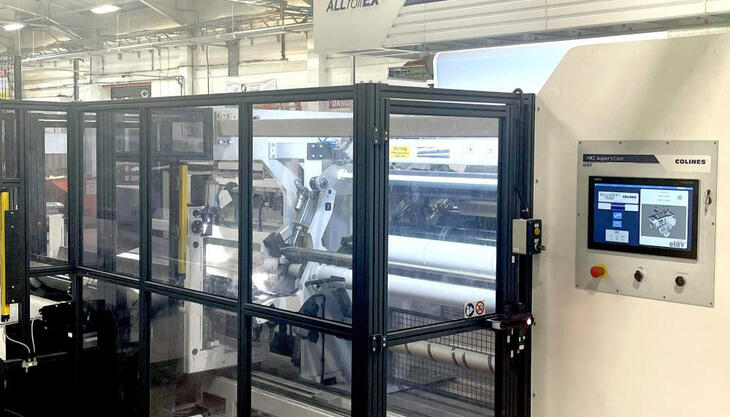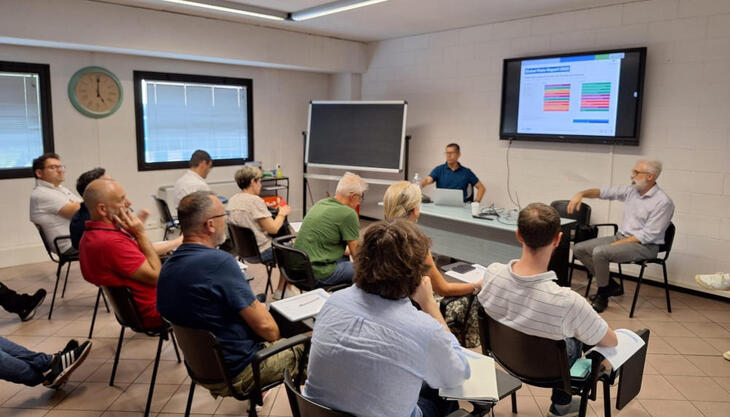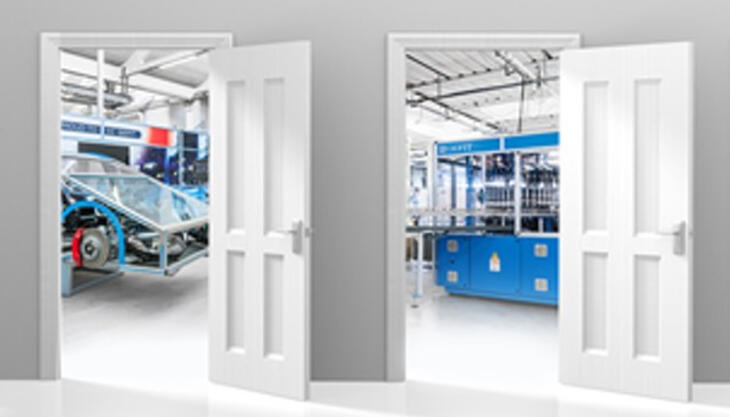Industry 4.0: the future of production through the intelligence of things
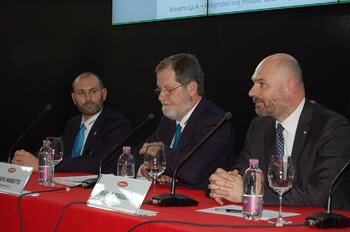
600 visitors from Italy and abroad (mainly from Russia and eastern European countries), 1,600 square metres of exhibition space occupied by around 250 auxiliary systems, one injection moulding machines and two running extrusion lines for bubble film, one of which was particularly large. These are some key data summarising Moretto ExpoTech, the event that, from 3 to 6 February 2016, occupied almost the whole of Hall 1 at the Samuplast fair in Pordenone, Italy.
This first Moretto ExpoTech was intended to extend the concept of a fair as both a showcase and an open house event. The Paduan manufacturer Moretto thereby set out to show off its full production potential through direct demonstrations, grouped by homogeneous families of auxiliary equipment. Furthermore, various workshops and presentations provided experts and academics with an opportunity to discuss in more general terms issues relating to the culture of plastics processing technology. This opportunity to share ideas gave rise to some innovative solutions.
February 4, for example, was given over to an important conference attended by existing and potential Moretto customers, but also by representatives of the general and specialised press.
The proceedings were opened by the director of Assocomaplast, Mario Maggiani, who stated: “Moretto is a historic member of Assocomaplast. As well as having been, for a long time, a member of the association's board, the company’s president, Renato Moretto, has always been, and still is, a great stimulus for the activities of Assocomaplast. In my view, he also embodies the spirit of the modern Italian entrepreneur: he is the demonstration of how, even starting out from nothing, it is possible to create important concerns that today play a fundamental role not only in Italy but also in Europe and the world. It is thanks to companies like this that the Italian plastics processing industry has grown and is continuing to do so.
The official 2015 year’s figures have not yet been published, but the available figures (January-October 2015) are almost definitive and, on the basis of the forecasts issued by the Assocomaplast research office, it has been calculated that exports in this sector last year amounted to a total value of 2.8 billion euros. I underline this because it tops the record figure of 2007 (2.75 billion euros), which was the best year ever for Italian plastics and rubber machinery manufacturers. The figure for the Italian domestic market, albeit more difficult to assess, was also positive: the industry's overall production increased by about 2.5%, marking a reversal of the trend seen in the previous years.
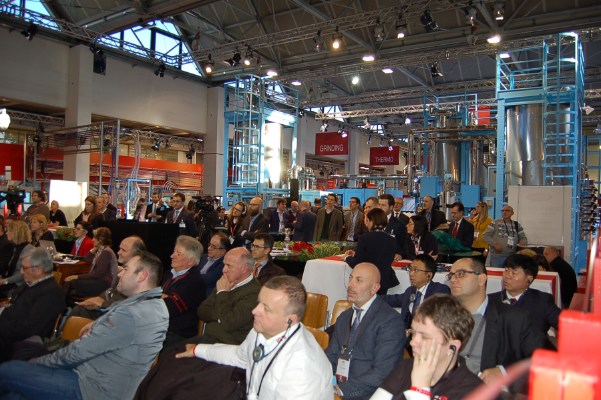 These results, however, would not have been
possible if Italy were not able to count on entrepreneurs willing to devote a
considerable amount of time to their companies in order to create products that
are, technologically, increasingly advanced and innovative. Today it is
impossible to compete on the international market unless you turn out top-of-the-line
products. And, as Renato Moretto has shown, we Italians are very good at doing just
that.”
These results, however, would not have been
possible if Italy were not able to count on entrepreneurs willing to devote a
considerable amount of time to their companies in order to create products that
are, technologically, increasingly advanced and innovative. Today it is
impossible to compete on the international market unless you turn out top-of-the-line
products. And, as Renato Moretto has shown, we Italians are very good at doing just
that.”
Engel Italia was the partner selected by Moretto to develop the injection moulding cell located at the entrance to Hall 1, its centerpiece being a Victory 80 tiebarless injection press that, according to Maurizio Passalacqua, “is the perfect compendium of economy, efficiency and compactness”. During the conference, the CEO of Engel Italia went on to remark that: “Our company has been working with Moretto for a good 25 years, during which time we have tried to develop commercial synergies on the market - for instance we share part of our sales network. We have also taken part, together, in trade fairs and open-house events. For example, on all but one occasion, Moretto systems have been assembled on the Engel machines exhibited at the Plast fair in Milan. This is because we have always appreciated the professionalism and reliability not just of the Moretto management, but also of the company’s employees who have worked with us on a day-to-day basis.”
During his presentation, Michele Bortolato (product marketing and system engineering manager at Moretto) described an application case concerning an important French company, Nemera, which produces medical devices, especially for inhalation and aerosol dispensers. The plant that uses the Moretto auxiliary equipment, situated not far from Paris, can reach a throughput rate of around 800 kg/hour. Nemera’s request, fully satisfied by the Padua-based manufacturer, was for a complete, automated and integrated system for handling plastic materials.
After the greetings and thanks from Stefano Scattolin, the mayor of Massanzago (Padua) - where Moretto has its headquarters - and of the communications manager of Banca Popolare FriulAdria, Fabrizio Pasco, the word passed to Renato Moretto.
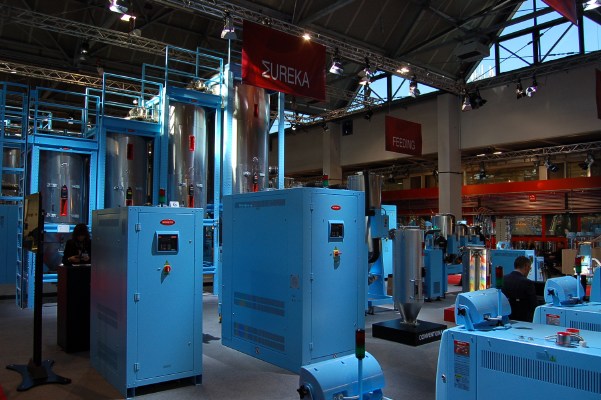 "I am convinced that the future asks us to
go back to manufacturing, but we have the task of re-engineering all production
processes deeply, focusing on the intelligence of the human protagonists, but
also on the ‘intelligence of things’. Today, I’m going to tell you about the
latter." These were the first clear words of Renato Moretto.
"I am convinced that the future asks us to
go back to manufacturing, but we have the task of re-engineering all production
processes deeply, focusing on the intelligence of the human protagonists, but
also on the ‘intelligence of things’. Today, I’m going to tell you about the
latter." These were the first clear words of Renato Moretto.
"Industry 4.0 will look just like a living organism," said Moretto exposing his own vision that, in fact, is already a reality in various parts of the world. "It will take advantage of future robotic systems, cyber and physical devices, the internet of things, the internet of services, big data. And all this will bring about a new approach: the production facilities will be flexible entities, able to interact with each other and to self-adapt in order to ensure quality and customisation. As a result, the way we produce will be ‘pandemic’, thanks to global design and data export systems, and also thanks to additive manufacturing and 3D printing technologies."
Renato Moretto then reiterated that plastics, in particular, can benefit a lot from this new modus operandi: "Industry 4.0 will also be strategic in an environmental sense too, because it will be able to reduce the enormous amounts of energy that are needed today to fuel the traditional production and processing of plastics.”
In closing, Renato Moretto explained to the public that - confirming the topicality of his futuristic vision - much of the philosophical principles of Industry 4.0 were discussed at the last World Economic Forum (held in Davos-Kloster, Switzerland, from 20 to 23 January 2016), where the steps, risks and opportunities of this unavoidable path were analysed, which is leading to the upcoming "fourth industrial revolution": a good chance for the European industry and in particular for the Italian industry.















